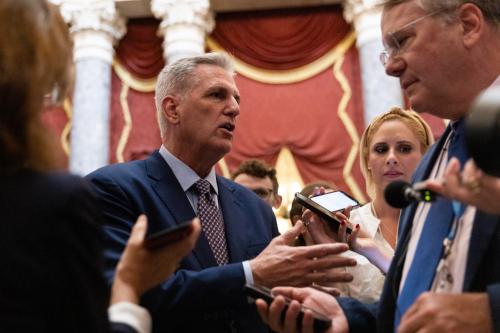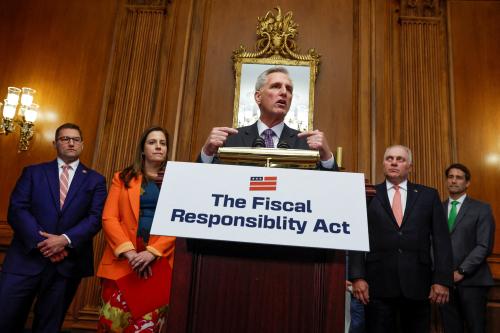In light of the apparently disappointing conclusion of the G-20 Summit in Seoul, it is important to review the expectations that preceded the summit, and to situate them in a realistic context of international relations among systemic economies after the U.S. Congressional elections on November 2.
Encouraged by the historically significant results of the London G-20 Summit in April 2009, where the G-20 succeeded in stabilizing the expectations of the financial markets, together leaders carved out for themselves a “premier” role in international economic cooperation at the Pittsburgh G-20 Summit later that year.
In support of such role, President Barack Obama proposed the so-called framework for strong, sustainable, and balanced growth. This framework is in effect a peer review mechanism that the United States, throughout modern history, had tacitly but consistently refused—even when, with the Second Amendment to the IMF’s Articles in the late 1970s, and under pressure from Europe, the U.S. reluctantly approved the regulatory powers of the Fund embedded in Article IV of its charter.
However, it was this issue of how to make the agreed framework operational and credible that caused the Seoul Summit to come to a standstill. This happened despite the fact that U.S. Treasury Secretary Geithner’s proposal to anchor the external adjustment of the systemic economies to numeric parameters had not been openly ruled out by the Chinese delegation at the G-20 finance ministers meeting in Gyeongju three weeks earlier. If anything, the Chinese delegation appeared to be inclined to give the proposal some consideration by emphasizing the need for a “reasonable” approach that would not be excessively penalizing and would pragmatically combine quantitative and qualitative indicators geared towards the medium term. Furthermore, the openness showed by the U.S. administration helped push forward the IMF reform package, which broadly surpassed any expectations in the run-up to the Gyeongju meeting.
What then caused the G-20 Seoul Summit to stall? First, the Chinese position grew increasingly rigid in the days leading up to the summit. The Chinese government has traditionally been reluctant to lock itself into a set of formal multilateral obligations that might restrict its field of policy action. Also, there were a series of contingent factors that simultaneously arose during the days preceding the summit, which reduced the bargaining flexibility of the countries involved.
Second, the U.S. Federal Reserve’s decision to buy $600 billion in U.S. Treasury bills—in the context of its well-known hyper-expansionary policy known as “QE2”—was unfortunately announced on the eve of the summit. This deepened the worries and irritation of the Chinese monetary authorities and those of other emerging economies against the backdrop of growing difficulty in containing spillovers effects.
Meanwhile, German leadership from the time of the Gyeongju finance ministers’ meeting worked to establish a united front against any variant of the U.S. proposal on targeting current account imbalances by unilaterally approaching the Chinese delegation.
However, the final nail in the coffin was the defeat of the Democrats in the U.S. midterm elections, only a week before the G-20 Summit. President Obama was left with a lame-duck Congress, while facing the prospect of a newly-elected Congress now deprived of a moderate centrist majority. This made him more vulnerable to the extreme factions of the two opposing parties, both unwilling to give political backing to initiatives that would have required generous concessions. As a result, the ability and willingness of the White House to take further risks in connection with new and uncertain political initiatives was heavily constrained.
It was no coincidence that in the days immediately preceding the summit, negotiations on the bilateral free trade treaty with Korea completely broke down as a result of opposition from powerful industrial groups. This proved embarrassing for the Korean hosts of the summit, not only for the breakdown but also for its unfortunate timing, just as the summit was imminent.
What will remain of this G-20 summit? Failure to reach an (admittedly difficult) agreement on a piloted across-the-board adjustment of balance-of-payments should not overshadow the rapid agreement achieved with regard to the Basil III Accord, which would not have been possible without the political momentum provided by the G-20 leaders.
The other significant outcome is IMF reform. Specifically, China will be elevated to the ranking of third largest IMF shareholder, surpassing Germany, as part of an overall 6 percent transfer of voting power to dynamic and under-represented economies. For the first time in the IMF’s recent history, this quota review will entail a re-composition of its Executive Board with a view to offering emerging economies a broader representation in the face of the corresponding reconfiguration of the Western European presence.
In the end, the White House played an important hand in making emerging economies, particularly China, responsible stakeholders in the international monetary system. This is exemplified by the growing awareness that greater voting rights and a stronger representation in IMF governance are necessary conditions if emerging market countries are to be called on to act as good citizens of the international community in the long term.
Paolo Guerrieri is Professor of Economics at the University of Rome “La Sapienza” and Vice President of Istituto Affari Internazionali.
Domenico Lombardi is President of the Oxford Institute for Economic Policy and Nonresident Senior Fellow at the Brookings Institution.



Commentary
Op-edU.S. Politics after Seoul: The Reality of International Cooperation
November 23, 2010